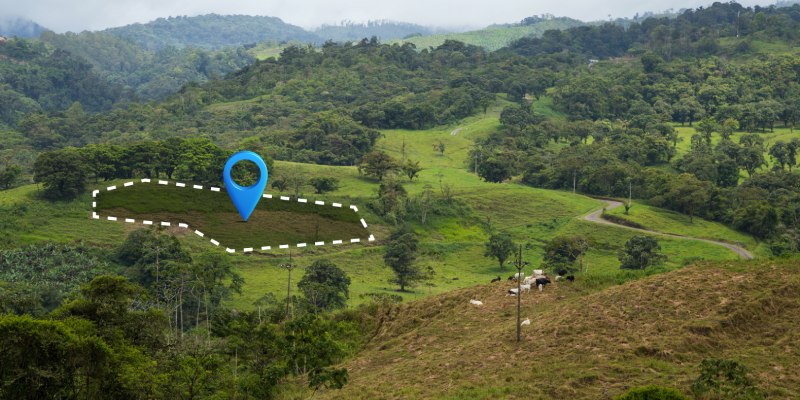Purchasing farmland in India is a significant investment with the potential for long-term wealth, especially in high-value crops like mangoes, pomegranates, and other commercial produce. However, first-time buyers often face challenges that can impact their returns. This guide highlights the Top 10 Essential Mistakes to Avoid for First-Time Farmland Buyers in India, helping you make informed, secure, and profitable farmland investments.
What Are the Top 10 Essential Mistakes to Avoid for First-Time Farmland Buyers in India?
Buying farmland in India can be a rewarding investment, but first-time buyers often make critical errors that can lead to legal, financial, or operational problems.
Here are the top 10 mistakes to avoid:
Neglecting Proper Due Diligence
Failing to verify land ownership, legal status, and encumbrances is one of the most critical Mistakes to avoid for First-Time Farmland Buyers in India. Without proper investigation, disputes, litigation, or financial loss can occur. Clear title verification ensures a secure investment and protects long-term interests in farmland.
What are the reasons for Neglecting Proper Due Diligence?
- Skipping title verification: Assumes ownership without checking legal property records thoroughly.
- Ignoring pending litigation: Fails to investigate existing legal disputes on the property.
- Overlooking land encumbrances: Misses mortgages or liens affecting land ownership clarity.
- Lack of professional advice: Avoids consulting legal experts for safe land purchase.
- Rushing the process: Purchases quickly without a detailed investigation of property details.
What are the solutions for Neglecting Proper Due Diligence?
- Conduct a full title search: Ensure legal ownership is verified before purchase.
- Review pending litigation: Confirm no ongoing disputes exist affecting land ownership.
- Check land encumbrances: Obtain the encumbrance certificate and validate all claims.
- Hire a legal expert: Consult a professional specializing in agricultural land matters.
- Verify agricultural suitability: Inspect land for soil, water, and crop potential.
Ignoring Soil Quality and Irrigation Facilities
One of the top Mistakes to avoid for First-Time Farmland Buyers is ignoring soil fertility and irrigation potential. Poor soil and inconsistent water supply can reduce crop yields and profitability. Understanding soil characteristics and irrigation systems ensures sustainable productivity for high-value crops like mangoes, pomegranates, or vegetables.
What are the reasons for Ignoring Soil Quality and Irrigation Facilities?
- No soil testing: Fails to evaluate fertility, pH, and nutrient levels accurately.
- Poor water assessment: Assumes natural water supply is sufficient for irrigation.
- Ignoring drainage issues: Overlooks waterlogging risks affecting crop growth and yield.
- Neglecting irrigation technology: Avoids installing drip or modern irrigation systems efficiently.
- Lack of professional advice: Doesn’t consult agronomists or soil experts for guidance.
What are the solutions for Ignoring Soil Quality and Irrigation Facilities?
- Conduct soil tests: Analyze pH, nutrients, and fertility for optimal crops.
- Evaluate water availability: Ensure reliable irrigation sources throughout growing seasons.
- Check drainage systems: Prevent waterlogging to maintain healthy soil conditions.
- Install modern irrigation: Implement drip or sprinkler systems for efficient watering.
- Consult experts: Seek advice from agronomists on soil and irrigation requirements.
Overlooking Local Regulations and Zoning Laws
Buying farmland without understanding zoning and local regulations is among the Essential Mistakes to avoid for First-Time Farmland Buyers in India. Non-compliance can result in fines, legal disputes, and restrictions on crop cultivation, affecting long-term investment returns. Understanding laws ensures legal, safe, and compliant farmland ownership.
What are the reasons for Overlooking Local Regulations and Zoning Laws?
- Lack of knowledge: Unaware of agricultural land use and zoning requirements locally.
- Ignoring crop restrictions: Doesn’t check permissible crops for the specific farmland.
- No permit verification: Fails to obtain required government approvals before purchase.
- Relying on assumptions: Assumes all farmland can be freely cultivated without rules.
- Skipping legal consultation: Doesn’t engage experts to confirm zoning law compliance.
What are the solutions for Overlooking Local Regulations and Zoning Laws?
- Research local zoning: Verify land is legally designated for agricultural purposes.
- Confirm crop restrictions: Check permitted crop types for compliance before cultivation.
- Obtain necessary permits: Secure approvals from authorities before starting farming activities.
- Consult local experts: Seek guidance from legal and agricultural professionals nearby.
- Review regulatory updates: Stay informed on policy changes affecting farmland use.
Underestimating Maintenance and Development Costs
Many new buyers make Mistakes to avoid for First-Time Farmland Buyers by focusing solely on purchase price and ignoring recurring expenses. Maintenance, labor, fertilizers, pest control, and irrigation can be costly. Proper financial planning ensures farm sustainability and prevents unexpected losses in agricultural investment.
What are the reasons for Underestimating Maintenance and Development Costs?
- Ignoring recurring expenses: Overlooks daily irrigation, fertilization, and pest control costs.
- Underestimating labor: Doesn’t account for seasonal and permanent workforce payments accurately.
- Skipping equipment maintenance: Avoids budgeting for machinery servicing and operational efficiency.
- Neglecting seasonal costs: Fails to consider monsoon or drought-related additional expenses.
- No financial planning: Lacks detailed budgeting for long-term farm development and maintenance.
What are the solutions for Underestimating Maintenance and Development Costs:
- Prepare a detailed budget: Include all initial and recurring farm maintenance expenses.
- Account for labor costs: Plan for seasonal and permanent workforce salary requirements.
- Maintain equipment regularly: Schedule servicing and repair costs for machinery efficiently.
- Include contingency funds: Prepare for unexpected expenses like crop failure or drought.
- Review budget periodically: Adjust expenses to maintain financial sustainability and profitability.
Failing to Research Market Demand
A common mistake to avoid for First-Time Farmland Buyers in India is neglecting market research. Crops must meet buyer demand and pricing trends. Without understanding consumer preferences and competition, farmers may struggle to sell produce at profitable rates, impacting ROI and farm sustainability.
What are the reasons for failing to Research Market Demand?
- Ignoring market trends: Doesn’t analyze price fluctuations and seasonal demand variations.
- Lack of buyer analysis: Fails to identify potential markets or distributors effectively.
- Relying on assumptions: Assumes crops will sell without market research or validation.
- Neglecting competition: Overlooks other farmers supplying the same crop in region.
- Skipping expert advice: Doesn’t consult market analysts or agribusiness professionals locally.
What are the solutions for failing to Research Market Demand?
- Conduct market research: Analyze prices, demand trends, and seasonal fluctuations carefully.
- Identify target buyers: Establish buyers or distributors before starting crop cultivation.
- Study competitor supply: Understand competition and market saturation for chosen crops.
- Choose high-demand crops: Focus on crops with strong profitability potential consistently.
- Consult market experts: Gain insights from agribusiness or commodity market professionals.
Ignoring Land Topography and Accessibility
Among the Mistakes to Avoid for First-Time Farmland Buyers, neglecting terrain and road access is critical. Difficult land can affect irrigation, transportation, and machinery use. Assessing slope, drainage, and connectivity ensures operational efficiency and smooth daily management of farmland activities.
What are the reasons for Ignoring Land Topography and Accessibility?
- Overlooking slope: Fails to check elevation and potential soil erosion risks properly.
- Ignoring drainage: Doesn’t assess water flow and accumulation during rains adequately.
- Poor road connectivity: Underestimates transportation challenges for produce or machinery access.
- No infrastructure planning: Fails to budget for roads or access improvements.
- Lack of professional assessment: Avoids consulting surveyors or engineers for terrain advice.
What are the solutions for Ignoring Land Topography and Accessibility?
- Inspect land slope: Ensure proper elevation for farming and water drainage management.
- Evaluate drainage systems: Confirm adequate water flow and flood prevention mechanisms.
- Ensure road access: Verify connectivity for machinery, labor, and transporting crops.
- Plan infrastructure: Budget for road construction or terrain modifications as needed.
- Seek expert assessment: Hire surveyors to evaluate land suitability and layout options.
Overlooking Climate and Environmental Factors
Ignoring climate and environmental conditions is one of the Essential Mistakes to avoid for First-Time Farmland Buyers in India. Temperature, rainfall, and humidity directly impact crop success. Proper analysis ensures the selection of suitable crops and mitigates environmental risks like drought, flood, or soil degradation.
What are the reasons for Overlooking Climate and Environmental Factors?
- No rainfall analysis: Doesn’t review historical rainfall patterns for irrigation planning accurately.
- Ignoring temperature extremes: Overlooks seasonal temperatures affecting crop growth and quality.
- Selecting unsuitable crops: Choose crops that cannot thrive in local environmental conditions.
- Failing to manage drought/flood: Doesn’t prepare for weather-related risks affecting yield.
- Lack of expert consultation: Avoids agronomists’ guidance on local climate challenges effectively.
What are the solutions for Overlooking Climate and Environmental Factors?
- Review historical climate data: Analyze rainfall, temperature, and humidity trends carefully.
- Select climate-suitable crops: Choose crops adaptable to local environmental conditions efficiently.
- Implement water management: Install rainwater harvesting and irrigation systems for stability.
- Plan for climate risks: Prepare contingency strategies for droughts, floods, or storms.
- Consult environmental experts: Seek guidance on sustainable farming and climate adaptation methods.
Failing to Verify Land Encumbrances
Among the Mistakes to Avoid for First-Time Farmland Buyers in India, not verifying mortgages, liens, or restrictions is serious. Clear ownership ensures legal safety. Without verification, buyers risk disputes, invalidated transactions, or financial loss, undermining their farmland investment from the beginning.
What are the reasons for failing to Verify Land Encumbrances?
- Skipping encumbrance certificate: Doesn’t obtain legal proof of debt-free ownership properly.
- Ignoring bank claims: Overlooks pending loans or mortgages linked to the property.
- Not reviewing government restrictions: Misses zoning, agriculture, or development constraints legally.
- Relying on verbal assurances: Assumes seller information is accurate without verification.
- Lack of legal help: Fails to engage lawyers to check land ownership thoroughly.
What are the solutions for Failing to Verify Land Encumbrances?
- Obtain encumbrance certificate: Verify no legal debts or mortgages exist on the property.
- Check bank and government records: Ensure no pending claims or liens exist legally.
- Review land history: Confirm clear ownership and absence of past disputes thoroughly.
- Seek legal consultation: Hire lawyer for comprehensive property verification efficiently.
- Verify with authorities: Cross-check land documents with local revenue and registration offices.
Choose Sanjevani Farms and Become a Successful First-Time Farmland Buyer
Investing in farmland doesn’t have to be complicated. Sanjevani Farms offers fully managed agricultural plots that are ready for immediate registration. Each plot is carefully developed with fertile soil, reliable irrigation systems, and proper access, allowing buyers to focus on farming instead of legal paperwork or maintenance hassles.
- Managed Farmland: All infrastructure, irrigation, and maintenance are fully taken care of.
- Ready for Registration: Clear legal titles with all approvals ensure smooth ownership transfer.
- High-Quality Soil and Water: Plots are prepared with nutrient-rich soil and dependable water supply.
- Hassle-Free Investment: Avoid common pitfalls such as legal disputes, encumbrances, or development delays.
- Prime Agricultural Location: Ideal for cultivating high-value crops and maximizing returns.
With Sanjevani Farms, first-time buyers can skip common mistakes in farmland investment and start cultivating immediately. It is a secure, stress-free, and profitable way to own agricultural land in India, making it the perfect choice for new investors.
Avoid the Top 10 Essential Mistakes for First-Time Farmland Buyers in India
Investing in agricultural land is a big decision, and avoiding common mistakes ensures long-term success. By choosing Sanjevani Farms and its hassle-free, fully managed farmland, first-time buyers can confidently invest in ready-to-register, fully developed plots. This helps them avoid the Top 10 Essential Mistakes to Avoid for First-Time Farmland Buyers in India while ensuring a smooth, profitable, and stress-free investment.
FAQs About the Mistakes to Avoid for First-Time Farmland Buyers in India
Buying farmland for the first time can be challenging. Here are answers to the most common questions to help you make informed, secure, and profitable investment decisions while avoiding common mistakes.





